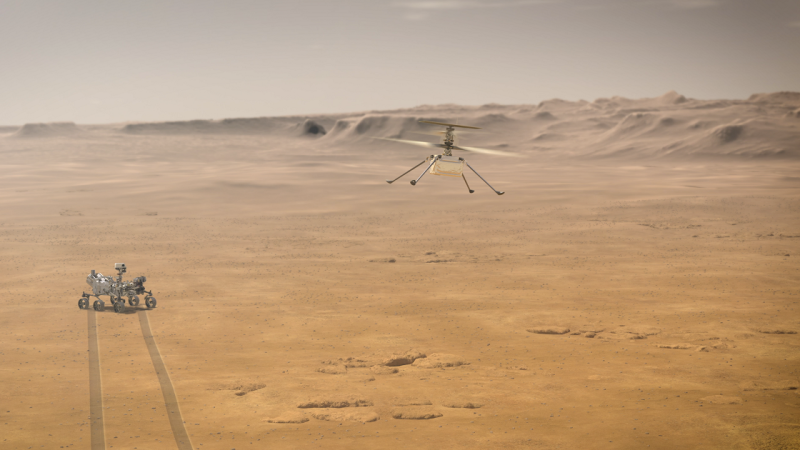Mars Rover Perseverance Lands On Red Planet And Starts Sending Images : NPR



Scott Neuman
Twitter 
Vanessa Romo
NASA
Updated at 4:48 p.m. ET
It's been a long journey for Perseverance, NASA's latest Mars rover, which landed safely on the red planet at 3:55 p.m. ET.
"I'm safe on Mars," the rover announced on Twitter upon its arrival. "Perseverance will get you anywhere."
I'm safe on Mars. Perseverance will get you anywhere.
#CountdownToMars
— NASA's Perseverance Mars Rover (@NASAPersevere) February 18, 2021
Perseverance, a six-wheeled, SUV-sized vehicle with the most sophisticated robotic astrobiology lab ever launched and an experimental aerial drone aboard, is at the heart of the Mars 2020 mission. It blasted off in July on a 293-million-mile journey. And immediately got to work, taking a photo of its "forever home."
Hello, world. My first look at my forever home. #CountdownToMarspic.twitter.com/dkM9jE9I6X
— NASA's Perseverance Mars Rover (@NASAPersevere) February 18, 2021

Space
Chinese Probe Enters Mars Orbit With Plan For May Landing
The rover isstarting its mission, exploring an ancient crater lake for signs of past life or in pieces strewn across the Martian landscape. The landing site is Jezero Crater where scientists think there was a lake 3.5 billion years ago. If there were microbes in the lake, they might have left signatures in the rocks in the crater that the rover can detect.
Seven minutes of terror
Success hinged on a nail-biting "seven minutes of terror" entry, descent and landing, or EDL, sequence that was completed flawlessly and without intervention from Earth-bound engineers. Because Mars is so far away, it takes 11 minutes for signals to reach NASA's Jet Propulsion Laboratory in Southern California, where the mission is managed. That meant that by the time engineers got a message from the spacecraft that EDL had begun, Perseverance was already on the ground — intact.
The atmosphere of Mars is a tiny fraction of Earth's — too thin to offer much in the way of a brake for a spacecraft on a speeding descent but thick enough to burn it up if something goes wrong. Many previous soft landing attempts on the planet have failed.
"Mars is hard, and we never take success for granted," Thomas Zurbuchen, NASA's associate administrator for science, said at a recent online media briefing.
The landing sequence for Perseverance is essentially the same high-wire act that a previous rover, Curiosity, used to land in 2012. But for their latest performance, scientists have chosen a more challenging spot on which to set down. Jezero Crater on the western edge of Isidis Planitia is a rougher patch. Unlike Curiosity, Perseverance will use something called Terrain Relative Navigation to find a good spot and steer itself in for a touchdown.
"So, while it's descending on the parachute, it will actually be taking images of the surface of Mars and determining where to go based on what it sees," says Swati Mohan, who is in charge of guidance, navigation and control for the spacecraft.
Jezero Crater
The now dry and dusty 28-mile-wide Jezero Crater shows unmistakable signs of having been filled with liquid water billions of years ago. Perseverance is set to land near an ancient river delta that once flowed into the basin.
Jezero was chosen from among 60 candidate landing sites after an extensive five-year study to weigh the merits of each location, according to NASA.
"In Jezero, we have one of the most beautifully preserved delta deposits on Mars in that crater," Katie Stack Morgan, the deputy project scientist for the mission, explains.
Perseverance Project scientist Ken Farley says that billions of years ago, it would have been an ideal place for microorganisms to have lived, "and it is also a wonderful place for those microorganisms to be preserved so that we can find them now."
YouTube
Ingenuity and other new gadgets
Although Perseverance superficially looks a lot like its predecessor, Curiosity, it's carrying a bevy of new scientific instruments. They include a better drill to take surface core samples, higher-resolution cameras, instruments to look at Martian mineralogy and detect organic compounds, ground-penetrating radar, a sort of Mars weather station and even microphones that will let earthlings hear what it sounds like on Mars for the first time.
But all the buzz is about the Mars Helicopter, known as Ingenuity. NASA is calling it a "technology demonstration." If successful, it will be the first powered flight on another world.
Despite the red planet's wispy atmosphere, engineers hope that Ingenuity's 4-foot rotors, spinning five times faster than the blades of a helicopter on Earth, coupled with the low Martian gravity, will help get it off the ground.
Like the first powered flight on Earth, Ingenuity's first flight, scheduled for the spring, will be short and close to the ground. If all goes well, a series of progressively more ambitious flights are planned over a 30-Martian-day period (just a little longer than on Earth).
"The Ingenuity Helicopter is considered a high-risk, high-reward technology demonstration," NASA says. "If the small craft encounters difficulties, the science-gathering of the Mars 2020 mission won't be impacted. If the helicopter does take flight as designed, future Mars missions could enlist second-generation helicopters to add an aerial dimension to their explorations."









cool. I love this kind of stuff.
Same here.
Things like this is why science and science education should be promoted, supported, and cheered.
Likewise. I'm waiting to see what the helicopter does and the photos from it
Am currently watching NOVA regarding this mission. Fascinating!
I'm tempted to rewatch Cosmos with Dr. Tyson hosting.
Never missed an episode. Loved his mentor Carl Sagan as well.
Neither did I. It was an awesome series.
Both have an infectious love of science and are good at explaining/teaching it. I could listen to Dr. Tyson talking about science all day. He does have some symposium lectures posted on Youtube. He knows how to reach an audience.
He definitely knows how to convey his passion for science.
Also watched Mr. Wizard and Bill Nye the Science Guy.
That's what makes it infectious.
What about Professor Proton?
Wait a minute..... Isn't Mars flat just like the Earth...?
Apparently not. Because - and this really happened - the Flat Earth Society say Mars has been observed to be round, but earth has not (that's Science, friends!). And yes, that was the Elon Musk trolling them.
So now, you can get the t-shirt. Because of course you can.
Also, there is a Twitter page .
That's probably why some landing attempts have failed. They misjudged the edge.
It's a matter of perspective. All heavenly bodies look round from a distance.
It takes getting up close to see the actual geography.
Some landings failed due to either computational errors or equipment failure. I remember reading about 1 probe that missed Mars because the calculation mathematical units were in standard rather than metric.
I remember face-palming over that one. What in the world were NASA scientists doing using the English system as opposed to metric? They made a laughingstock of themselves, and spent a ton of money (metric ton, of course) doing it.
That was a big goof. I think it was the Mars Climate Orbiter. Basically, it was human error.
Yeah, but I think they have redeemed themselves in recent years. To be fair, designing, building, mathematically calculating planet position, launch windows, travelling distance, communication delay times, and orbital trajectory, to say nothing of deorbit and actual safe landing is no easy task. So we can't be too harsh when a probe mission fails.
No, but it's made a lot harder by using an antiquated system of measurement.
This is true. It probably doesn't help that our country generally uses said antiquated system or that we're generally taught and are familiar with it more over metrics. That reminds me of the original Star Trek series. They occasionally used standard measurements rather than metric. You would think a futuristic space faring society would adopt the metric system. It just shows how much the standard system permeates society and thinking.
What amuses me is that all the English units are legally defined by metric units.
An inch is, by law, exactly 25.4 millimeters.
Why? Measurement schemes are arbitrary.
Personally, I'm not a fan of the metric system. I'll take the fractional imperial system any day of the week. Off the top of my head, I can't think of a single thing that I prefer metric for.
Easier math, for one thing. And easier collaboration with other scientists who use the metric system exclusively.
What if it's still round upon closer inspection?
I know what that means...
"I'm DEAD SEXY."
Not really. The metric system makes more sense. There's a reason why it's generally used in science and medicine.
I suspect most people are not either. But I chalk that up to being taught the standard system and lack of promotion of metrics outside of science. People are just not used to it.
The metric system is so easy to work with. Fractions are a pain in the ass compared to moving a decimal point.
Or converting decimals to fractions and vice versa.
Yup. Much easier to deal with multiples of 10 than multiples of 3 and 12 and fractions of 1/16th.
The math is exactly the same. You can use decimals, exponents, and fractions for either set of units.
I just think the metric units suck for everyday use — kilometers instead of miles; KPH instead of MPH; liters instead of gallons; hectares instead of acres; a person being 1.8 meters tall instead of 6ft., or weighing 81.6 kilos instead of 180 lbs.
Metric units are mostly gibberish to me, except for the smaller ones like centimeters, millimeters, and microns. The world of the very small is dominated by metric units, and I don't mind that at all. I know it's just a matter of familiarity, giving the units meaning. They can keep the rest of them, though. Not interested. I like my imperial units just fine, thank you.
I can't say that I ever use fractions at all when doing calculations in the metric system. I might say "a millimeter and a half" in casual conversation, but I write "1.5 mm". I use fractions when using the imperial system, but the math is harder then - no pushing decimals back and forth. I can do the math, but it takes longer, and there's a lot more changing back and forth between fractions and decimals.
I grew up with inches, and then spent four decades almost exclusively in metric. Now I'm bilingual.
My wife broke out laughing at a socket-wrench set, with sockets like 15/16".
It's a question of what you're accustomed to.
Objectively, Fahrenheit is silly. 32° for freezing is not very obvious. 0° is obvious. 212° for boiling?? Seriously? It's 100° in a reasonable system.
5280 feet in a mile?? WTF?
Before I went to Europe, all those crazy units were natural for me, because I grew up with them. Now... not so much.
But it's not a big deal... unless you forget to convert...
The units are the only difference. There's no separate math for metric units. An equation using kilograms, meters, or kilometers per second (for example) is calculated just as easily with pounds, feet, or miles per second. It's the exact same math. Fractions don't even have to be used.
If I'm given a measurement in feet and inches, and need to do math with it, I either have to convert it to fractions, then back to feet and inches, or keep track of how many inches I have, and divide by 12, and keep track of the remainder.
If I'm given a measurement in centimeters, I just add them up. If I need to convert the centimeters into meters, I move a decimal point.
I can do either, but it's a lot quicker to move decimal points.
And when doing complex math, as in for planning a mission to Mars, adding more steps to the math, introduces more opportunities to err.
Fahrenheit is silly? Celsius is a 'reasonable' system? Your definition of objectivity must be different than mine. The Fahrenheit scale has a higher resolution, and conveys more accurate information in things like weather reports than C does (where temps are generally expressed in whole numbers).
The freezing and boiling points of a particular liquid at sea level with 1 atmosphere of pressure are arbitrary markers that don't even apply to most people on the planet. Water does not boil at 100C in Denver. More like 94.
The same is true of Fahrenheit, of course, but I don't see what makes it any sillier than Celsius. Its higher resolution (in general whole number usage) makes it preferable as far as I'm concerned.
I also like how hitting 100 in Fahrenheit means it's officially frikkin hot.
My chemistry professor used to say, "Celsius takes temperatures to new Farenheits..."
Don't the engineers who benefit from metric units already use them?
That's fine with me as long as we can sill use miles, gallons, pounds, ounces, acres, yards, feet, and inches in our daily lives.
I use miles when driving, and millimeters when working.
But I think it would be a good idea for the US to convert to metric already, so we don't wait to get kids who might be going into the sciences comfortable with the terminology they'll be using.
I agree. It would only take one generation.
Old farts like me can just deal.
Since I'm in the electrical field I enjoy using SI units that are pretty much internationally accepted. Other than referring to "voltage" as "tension", and using 50Hz rather than 60Hz for the nominal system frequency in Europe and other places, we are all pretty much driving on the same side of the road when it comes to power/electrical terminology. Some of the symbols they use differ from ours, but the concepts for volts, amps, watts, vars, joules, Hz, ohms, farads, henrys, etc. are all pretty much universal.
How do you figure? The metric system uses decimals. Most digital thermometers show to the tenth of a degree. Lab equipment goes to whatever precision is needed. Simply sliding the decimal.
But like I said, it mostly depends on what you're accustomed to.
Nearly twice as many increments between freezing and boiling = higher resolution.
Same with Fahrenheit.
never mind
Well, it's true.
And as I said (but you ignored), in general usage whole numbers are used. Meteorologists don't say things like, "We're expecting a high of 54.2345 degrees tomorrow."
whatever
Feelings hurt, Bob?
oh, s-o-o-o badly!
I'm dying...
Wow.
Just... wow!
Is this cool or what.
Love it.
Go USA...not all doom and gloom over there...look forward to seeing the happy snaps from Mars..has been headlines here...makes a change from the virus..
Awesome video Bob!
Spent 13 years working Environmental issues (HazMat, NEPA, Cultural/Natural) at Patrick AFB and Cape Canaveral. Got to see some awesome launches, meet some great astronauts, and see some amazing engineering - yeah, I miss it.
Nice Video Bob.
I walked along side my Father as he played golf at Patrick during the Gemini Program. He supervised the calibration lab there at the space center. Meters, torque wrenches..... If it had to be traceable back to the Bureau of Standards with a calibration sticker, it went through his lab.
Watching night launches from Cocoa Beach were something to remember. I couldn't imagine what a Saturn V launch would feel like.
NASA Live Feed
I hate to make it sound like I’m down on the project or something, but this is the picture all the hype was building to? I hope that ain’t it. I hope it gets better. Considering the pictures my phone can take, this is kind of embarrassing. The phone I had 20 years ago took better pictures.
My understanding is that the first several images came just after it landed and there was still a great deal of dust in the "air" as well as on the equipment and lens. I'm thinking we will see some MUCH better images from the Perseverance in the coming days and weeks.
I mean, I assume that transmitting sharp, color images probably requires more data to be transmitted, so I’m not expecting great photos the moment it hits the ground. Still, the tiny camera in my phone is so bitchin’, I don’t even look at my SLR anymore (although it can still take a better picture). And at least on Earth, I can share brilliant photos and HD video almost instantly. I know they need to save weight and all that, but how hard would it have been to strap something like an iPhone to this thing?
This picture they’re showing this morning is better. Still, though, not blowing my mind.
I see what looks like a lost key and a cigarette butt just above the wheel in this shot. Looks like life on Mars is not much different than Earth.
Bloody tourists!
I don't know, I think seeing ground level, near real time images from another planet to be mind blowing in itself.
Indeed! Although in the 11 minutes it takes to transmit that tourist could have smoked that cigarette and flicked the butt to the ground next to his house key and fled the scene.
Also, I'm really looking forward to images from the Ingenuity Mars Helicopter. That will really be cool!
It would be really cool to see similar images from Europa or other planets/moons in our solar system as well. I think we might see that in our lifetime....I hope!
So did I - in the 1970s . Here is a picture from Viking - our first probe to land on Mars:
Do the new pictures look 40 years better? They don’t to me.
Grinch...
At least we have color images now.
If I remember correctly, the Curiosity rover captured a panoramic view of Mars. That was impressive. Still, it's not just the pictures from another planet that are mind blowing, it's also how we can send probes to (and land on) Mars with increasing frequency and success. We're doing the same with asteroids floating through space too. It's all mind blowing and exciting. Just wait until the first astronauts send their pics from the surface of Mars. Someday.
Looks like the mast with the good cameras hasn't been deployed yet.
NASA's Perseverance Rover Sends Sneak Peek of Mars Landing
That article does have an HD shot of Perseverance hanging in the air just before touchdown:
I hope that's just a still from a video of the landing, which is what I'm really wanting to see.
I'm looking forward to that too. Especially for the day we take up close pics of Europa and other moons, to say nothing about possibly landing probes on them like we did with Titan.
At the rate we're going, it'll look like this:
If I could get a pic of Cindy Lou Who from Mars, my heart would grow three sizes.
Oh that is interesting. I look forward to that.
You would think that just for public relations, that would be the first thing they'd want to deploy. Good pictures > public enthusiasm > more funding.
The lens cap was still on. Pics will get better.
I just watched a recording of the press conference from yesterday and they said they expect to have the first video ready for release at another press conference on Monday. They should also have the main cameras up and running by then.
I look forward to it.
See my post at comment 9 below.
Thanks. I recorded the press conference today and watched it earlier. Very cool, but it sucks that something messed up and they didn't record any audio of the descent or landing.
If anyone's interested, here's the Perseverance image page from NASA.
There aren't many processed images there yet, but you can click the hamburger icon at the top right and go to the multimedia tab for thousands of non-color-processed shots.
All free to download. One guy at the press conference today was encouraging people to download them to help look around, or to make phone or desktop backgrounds out of them if you want.
The video and audio files are there, too.
Thanks for that. That's really cool. How can anyone not love science?
Actually, it would probably prove difficult. The atmosphere [or lack there of] and temp fluctuations and all other known and unknown variables at play, NASA needs to be as cautious as possible and probably has to use materials far superior to what an iPhone uses. The camera is likely designed to photograph as necessary, but nothing beyond necessary.
Extreme temperature fluctuations is certainly a consideration. Mars temp averages -80F in non polar regions. To put that in perspective, water will generally freeze instantly at around -40F. Then there's the constant exposure to solar radiation during transit and after landing on Mars. Power supply is always a concern. Then there's the transition through the martian atmosphere and landing. Rover equipment must be robust enough to function despite all that, and probably more.
Or the rover had its thumb in front of the lens.
You'd think, but no. They said that the EDL cameras and microphone were off-the-shelf products that anybody can buy. They were just there for entry, descent and landing, and didn't need to last any longer than that.
The wind recordings on the surface were taken with the EDL mic, so it's still working for the time being, but they don't expect it to last. Luckily, they said the Mastcam-Z camera has another microphone, and that whole assembly was purpose-built for Mars, so it should last a while, hopefully.
Back in the early 1950s, reading Sci-Fi journals with stories by Arthur C. Clark, Isaac Aasimov, Ray Bradbury, "Doc" Edward E. Smith, Frank Herbert, etc I could then only imagine what we are seeing happen now. As I've said so many times now, Art imitates Life is being usurped now by Life imitates Art. Let's hope it doesn't imitate The Day After Tomorrow these days.
Cool video of landing released a few hours ago
Ultra-Cool!
I find this all very fascinating. To me, 11 minutes is pretty damn fast considering the distance. I'm looking forward to seeing what's to come of this journey! What's really awesome is that considering my age, I may very well witness humans landing on Mars! My grannie, born in 1900, died in 1995, witnessed so many fascinating inventions, journeys, and discoveries... it's pretty significant, to me at least, that in a relatively short time, we've made it to Mars.
LOL!
Ok, that's a good one.
Too funny
Fascinating, as Spock would say!
McCoy [to Spock]: "And please do not say it's fascinating."
Spock: "No. But it is, interesting."
McCoy: [rolls eyes]
It's funny cuz it's true.